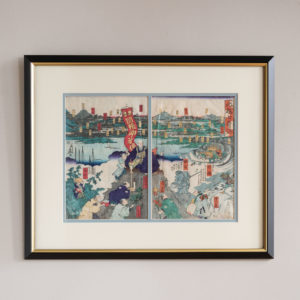269 items found
Page 1 of 3
-
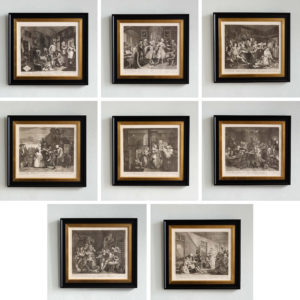
A Rake’s Progress after William Hogarth. A set of eight copper-engraved prints
£2,800 the set of eightA Rake’s Progress after William Hogarth. A set of eight copper-engraved prints
1803 Thomas Cook edition. Framed in black with a gold slip.£2,800 the set of eight -
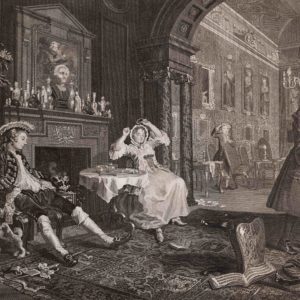
Marriage-a-la Mode, after William Hogarth. A set of six copper-engraved prints
£2,200 the set of sixMarriage-a-la Mode, after William Hogarth. A set of six copper-engraved prints
1803 Thomas Cook edition. Framed in black with a gold slip.£2,200 the set of six -

Eagle Wharf, Whistler
£1,200Eagle Wharf, Whistler
A framed black-line etching by the American artist and engraver James MacNeil Whistler showing shipping off Eagle Wharf off Wapping in the Pool of London. Taken from 'A Series of Sixteen Etchings of Scenes on the Thames and Other Subjects', otherwise referred to as The Thames Set, the pictures were created over a period of 12 years starting in 1859 and finally published as a complete set by Ellis & Green in London in 1871.£1,200 -

The Dance, by Henri Matisse, Jan – March 1939 / No. 4.
£1,200The Dance, by Henri Matisse, Jan – March 1939 / No. 4.
The Verve Review was a purposefully luxurious. It ran from 1937 to 1960, but with only 38 editions available, due to the high degree of design and editorial work dedicated to each issue. Each edition contained unique lithographic prints, commissioned by the editor, and each cover a double-page lithograph elaborated by one of the artists contained within. It was the brainchild of its editor Stratis Eleftheriades, a Greek National who moved to Paris in the early thirties to take part in the growing Modernist movement, writing under the name of Teriade.£1,200 -
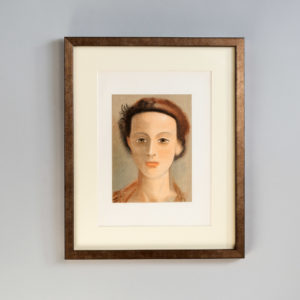
Portrait by Andre Derain, Verve Vol 2 / No. 5-6.
£800Portrait by Andre Derain, Verve Vol 2 / No. 5-6.
The Verve Review was a purposefully luxurious. It ran from 1937 to 1960, but with only 38 editions available, due to the high degree of design and editorial work dedicated to each issue. Each edition contained unique lithographic prints, commissioned by the editor, and each cover a double-page lithograph elaborated by one of the artists contained within. It was the brainchild of its editor Stratis Eleftheriades, a Greek National who moved to Paris in the early thirties to take part in the growing Modernist movement, writing under the name of Teriade.£800 -
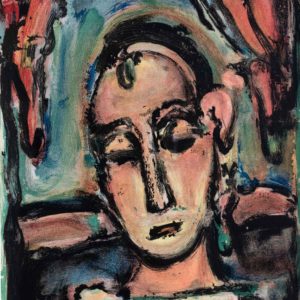
Head of a Girl by George Rouault, Verve Vol 2 / No. 5-6.
£800Head of a Girl by George Rouault, Verve Vol 2 / No. 5-6.
The Verve Review was a purposefully luxurious. It ran from 1937 to 1960, but with only 38 editions available, due to the high degree of design and editorial work dedicated to each issue. Each edition contained unique lithographic prints, commissioned by the editor, and each cover a double-page lithograph elaborated by one of the artists contained within. It was the brainchild of its editor Stratis Eleftheriades, a Greek National who moved to Paris in the early thirties to take part in the growing Modernist movement, writing under the name of Teriade.£800 -
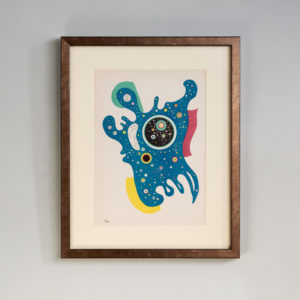
Stars by Wassily Kandinsky, Verve Vol. 1 / No. 2.
£800Stars by Wassily Kandinsky, Verve Vol. 1 / No. 2.
The Verve Review was a purposefully luxurious. It ran from 1937 to 1960, but with only 38 editions available, due to the high degree of design and editorial work dedicated to each issue. Each edition contained unique lithographic prints, commissioned by the editor, and each cover a double-page lithograph elaborated by one of the artists contained within. It was the brainchild of its editor Stratis Eleftheriades, a Greek National who moved to Paris in the early thirties to take part in the growing Modernist movement, writing under the name of Teriade.£800 -
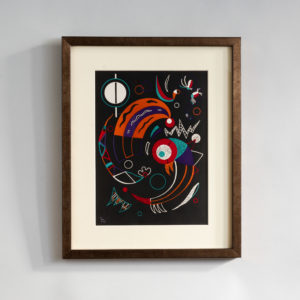
Comets by Wassily Kandinsky, Verve Vol. 1 / No. 2.
£800Comets by Wassily Kandinsky, Verve Vol. 1 / No. 2.
The Verve Review was a purposefully luxurious. It ran from 1937 to 1960, but with only 38 editions available, due to the high degree of design and editorial work dedicated to each issue. Each edition contained unique lithographic prints, commissioned by the editor, and each cover a double-page lithograph elaborated by one of the artists contained within. It was the brainchild of its editor Stratis Eleftheriades, a Greek National who moved to Paris in the early thirties to take part in the growing Modernist movement, writing under the name of Teriade.£800 -
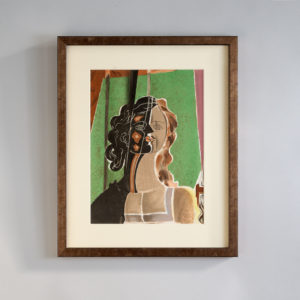
Figure by Georges Braque, Verve Vol 2 / No. 5-6.
£800Figure by Georges Braque, Verve Vol 2 / No. 5-6.
The Verve Review was a purposefully luxurious. It ran from 1937 to 1960, but with only 38 editions available, due to the high degree of design and editorial work dedicated to each issue. Each edition contained unique lithographic prints, commissioned by the editor, and each cover a double-page lithograph elaborated by one of the artists contained within. It was the brainchild of its editor Stratis Eleftheriades, a Greek National who moved to Paris in the early thirties to take part in the growing Modernist movement, writing under the name of Teriade.£800 -
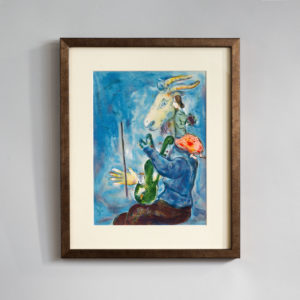
Printemps by Marc Chagall, Verve Vol. 1 / No. 3.
£800Printemps by Marc Chagall, Verve Vol. 1 / No. 3.
The Verve Review was a purposefully luxurious. It ran from 1937 to 1960, but with only 38 editions available, due to the high degree of design and editorial work dedicated to each issue. Each edition contained unique lithographic prints, commissioned by the editor, and each cover a double-page lithograph elaborated by one of the artists contained within. It was the brainchild of its editor Stratis Eleftheriades, a Greek National who moved to Paris in the early thirties to take part in the growing Modernist movement, writing under the name of Teriade.£800 -
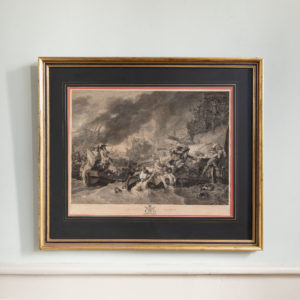
The Battle at La Hogue
£750The Battle at La Hogue
A large framed and mounted black line engraving by William Wollett afer the painting by Benjamin West showing the Anglo-Dutch naval victory at La Hogue off the coast of Normandy in 1692. " Standing in a boat at the left ... Vice Admiral George Rooke embodies heroic command with his upright posture and raised sword... Beached in the center distance is the French flagship, the Royal Sun. Actually burned and sunk a few days before this encounter, the Royal Sun is here deliberately refloated -- only to be run against the cliffs so that West might symbolize the French defeat." U.S. National Gallery of Art, Washington D.C.£750 -
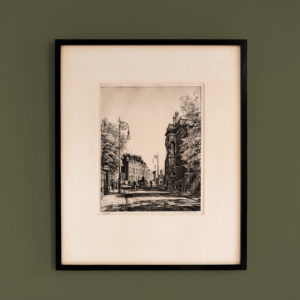
Poplar
£650Poplar
An original framed and mounted dry-point engraving by the artist engraver Frances Dodd RA showing Poplar Old Town hall on Newby Place in 1930. Hand signed in pencil by the artist.£650 -
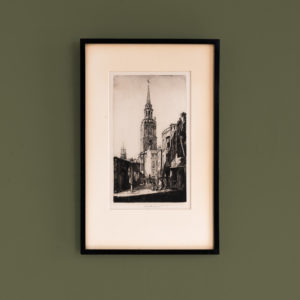
St. James’s Church Clerkenwell
£650St. James’s Church Clerkenwell
A framed and mounted black line etching by the English artist Sir Henry Rushbury KCVO CBE RA (28 October 1889 – 5 July 1968) depicting St James's Church Clerkenwell. Signed in pencil by the artist. Clerkenwell contained a notorious slum at the turn of the 20h Century and was the setting for George Gissing's Novel, The Netherworld - "Opposite, the shapes of poverty-eaten houses and grimy workshops stood huddling in the obscurity. From near at hand came shrill voices of children chasing each other about – children playing at midnight between slum and gaol!"£650 -
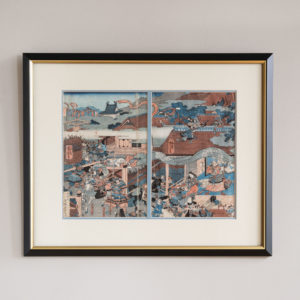
Japanese Woodblock Diptych.
£600 -
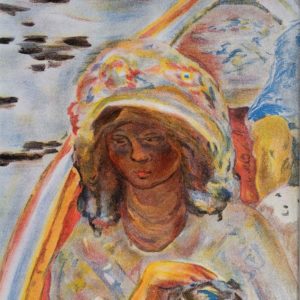
Portrait Fragment by Pierre Bonnard, Verve Vol 2 / No. 5-6.
£600Portrait Fragment by Pierre Bonnard, Verve Vol 2 / No. 5-6.
The Verve Review was a purposefully luxurious. It ran from 1937 to 1960, but with only 38 editions available, due to the high degree of design and editorial work dedicated to each issue. Each edition contained unique lithographic prints, commissioned by the editor, and each cover a double-page lithograph elaborated by one of the artists contained within. It was the brainchild of its editor Stratis Eleftheriades, a Greek National who moved to Paris in the early thirties to take part in the growing Modernist movement, writing under the name of Teriade.£600 -
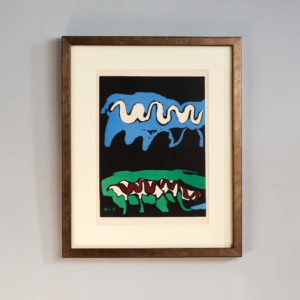
The Four Elements, Earth by Francisco Bores, Verve Vol. 1 / No. 1.
£600The Four Elements, Earth by Francisco Bores, Verve Vol. 1 / No. 1.
The Verve Review was a purposefully luxurious. It ran from 1937 to 1960, but with only 38 editions available, due to the high degree of design and editorial work dedicated to each issue. Each edition contained unique lithographic prints, commissioned by the editor, and each cover a double-page lithograph elaborated by one of the artists contained within. It was the brainchild of its editor Stratis Eleftheriades, a Greek National who moved to Paris in the early thirties to take part in the growing Modernist movement, writing under the name of Teriade.£600 -
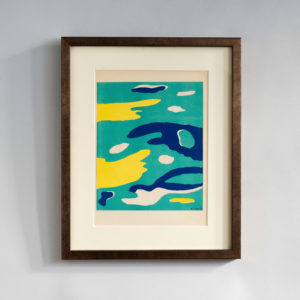
The Four Elements, Water by Fernand Leger, Verve Vol. 1 / No. 1.
£600The Four Elements, Water by Fernand Leger, Verve Vol. 1 / No. 1.
The Verve Review was a purposefully luxurious. It ran from 1937 to 1960, but with only 38 editions available, due to the high degree of design and editorial work dedicated to each issue. Each edition contained unique lithographic prints, commissioned by the editor, and each cover a double-page lithograph elaborated by one of the artists contained within. It was the brainchild of its editor Stratis Eleftheriades, a Greek National who moved to Paris in the early thirties to take part in the growing Modernist movement, writing under the name of Teriade.£600 -
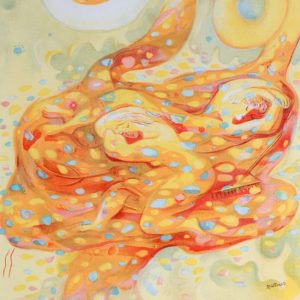
Autumn by Abraham Rattner, Verve Vol. 1 / No. 3.
£600Autumn by Abraham Rattner, Verve Vol. 1 / No. 3.
The Verve Review was a purposefully luxurious. It ran from 1937 to 1960, but with only 38 editions available, due to the high degree of design and editorial work dedicated to each issue. Each edition contained unique lithographic prints, commissioned by the editor, and each cover a double-page lithograph elaborated by one of the artists contained within. It was the brainchild of its editor Stratis Eleftheriades, a Greek National who moved to Paris in the early thirties to take part in the growing Modernist movement, writing under the name of Teriade.£600 -
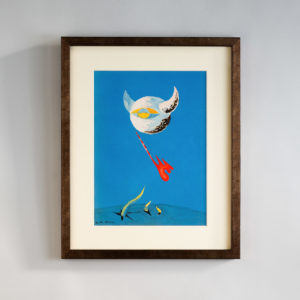
The Moon by André Masson, Verve Vol. 1 / No. 2.
£600The Moon by André Masson, Verve Vol. 1 / No. 2.
The Verve Review was a purposefully luxurious. It ran from 1937 to 1960, but with only 38 editions available, due to the high degree of design and editorial work dedicated to each issue. Each edition contained unique lithographic prints, commissioned by the editor, and each cover a double-page lithograph elaborated by one of the artists contained within. It was the brainchild of its editor Stratis Eleftheriades, a Greek National who moved to Paris in the early thirties to take part in the growing Modernist movement, writing under the name of Teriade.£600 -
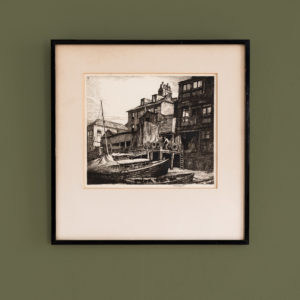
Buildings & Boats
£550Buildings & Boats
A framed and mounted black line etching by the artist-engraver Norman Jones RWS RE RSMA, showing a riverside wharf scene in the Lower Pool of the River Thames, possibly corresponding to the river frontage of Narrow Street, Limehouse. Signed in pencil by the artist.£550 -
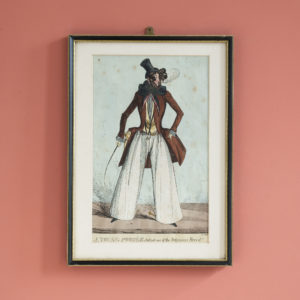
‘A Young Poodle, but not one of the Sagacious Breed’
£520‘A Young Poodle, but not one of the Sagacious Breed’
Caricaturist, presumably of Irish background, but undocumented. Responsible for a small number of plates in a distinctive hand. Unclear whether he etched them all or only designed them. Never a publisher. Worked for P.Roberts and J.Aitken. Many unsigned prints by both men may well be by him.£520 -
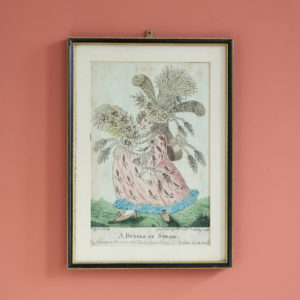
A Bundle of Straw, My Spouse is Remarkable Tasty in his Dress & he likes to see me so.
£520A Bundle of Straw, My Spouse is Remarkable Tasty in his Dress & he likes to see me so.
Caricaturist, presumably of Irish background, but undocumented. Responsible for a small number of plates in a distinctive hand. Unclear whether he etched them all or only designed them. Never a publisher. Worked for P.Roberts and J.Aitken. Many unsigned prints by both men may well be by him.£520 -
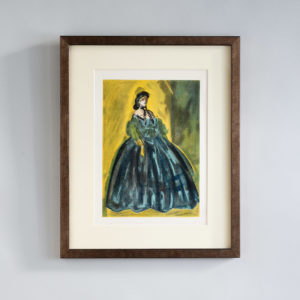
Portraits Part II by Constantin Guys, Verve Vol 2 / No. 5-6.
£500Portraits Part II by Constantin Guys, Verve Vol 2 / No. 5-6.
The Verve Review was a purposefully luxurious. It ran from 1937 to 1960, but with only 38 editions available, due to the high degree of design and editorial work dedicated to each issue. Each edition contained unique lithographic prints, commissioned by the editor, and each cover a double-page lithograph elaborated by one of the artists contained within. It was the brainchild of its editor Stratis Eleftheriades, a Greek National who moved to Paris in the early thirties to take part in the growing Modernist movement, writing under the name of Teriade.£500 -
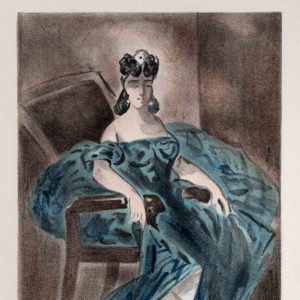
Portraits Part I by Constantin Guys, Verve Vol 2 / No. 5-6.
£500Portraits Part I by Constantin Guys, Verve Vol 2 / No. 5-6.
The Verve Review was a purposefully luxurious. It ran from 1937 to 1960, but with only 38 editions available, due to the high degree of design and editorial work dedicated to each issue. Each edition contained unique lithographic prints, commissioned by the editor, and each cover a double-page lithograph elaborated by one of the artists contained within. It was the brainchild of its editor Stratis Eleftheriades, a Greek National who moved to Paris in the early thirties to take part in the growing Modernist movement, writing under the name of Teriade.£500 -
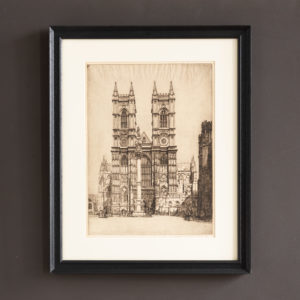
Westminster Abbey by Mortimer Mempes
£480Westminster Abbey by Mortimer Mempes
Mortimer Luddington Menpes. Printmaker, painter of genre, architectural subjects, and writer was born in Alelaide, Australia and came to England c.1875 where he remained until his death in 1938.£480 -
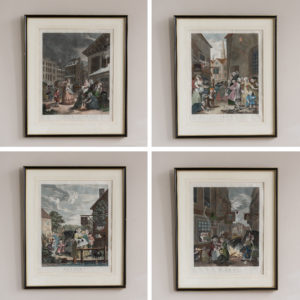
Hogarth, The Four Times of the Day
£450 the setHogarth, The Four Times of the Day
Set of four prints after William Hogarth, showing the four times of the day during different seasons of the year. Printers crease on the noon plate, published c 1805 by Thomas Cook, with old hand-colour. Framed£450 the set -
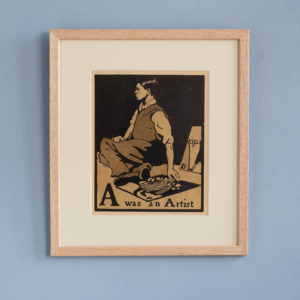
An Alphabet by William Nicholson, A was an Artist,
£400 eachAn Alphabet by William Nicholson, A was an Artist,
Nicholson was recommended by his friend, James McNeil Whistler to the publishers Heinemann as an original and expert wood-cut artist. The relationship with the publisher was highly successful, establishing Nicholson’s reputation as an illustrator. Between 1897 and 1900 he illustrated five works: An Alphabet, An Almanac of Twelve Sports, Twelve Portraits, London Types, and The Square Book of Animals.£400 each -
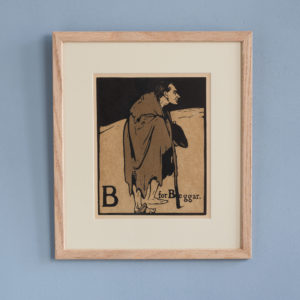
An Alphabet by William Nicholson, B for Beggar,
£400 eachAn Alphabet by William Nicholson, B for Beggar,
Nicholson was recommended by his friend, James McNeil Whistler to the publishers Heinemann as an original and expert wood-cut artist. The relationship with the publisher was highly successful, establishing Nicholson’s reputation as an illustrator. Between 1897 and 1900 he illustrated five works: An Alphabet, An Almanac of Twelve Sports, Twelve Portraits, London Types, and The Square Book of Animals.£400 each -
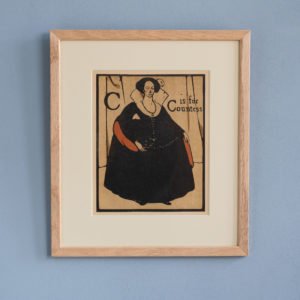
An Alphabet by William Nicholson, C is for Countess,
£400 eachAn Alphabet by William Nicholson, C is for Countess,
Nicholson was recommended by his friend, James McNeil Whistler to the publishers Heinemann as an original and expert wood-cut artist. The relationship with the publisher was highly successful, establishing Nicholson’s reputation as an illustrator. Between 1897 and 1900 he illustrated five works: An Alphabet, An Almanac of Twelve Sports, Twelve Portraits, London Types, and The Square Book of Animals.£400 each -
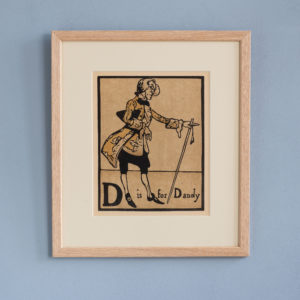
An Alphabet by William Nicholson, D is for Dandy,
£400 eachAn Alphabet by William Nicholson, D is for Dandy,
Nicholson was recommended by his friend, James McNeil Whistler to the publishers Heinemann as an original and expert wood-cut artist. The relationship with the publisher was highly successful, establishing Nicholson’s reputation as an illustrator. Between 1897 and 1900 he illustrated five works: An Alphabet, An Almanac of Twelve Sports, Twelve Portraits, London Types, and The Square Book of Animals.£400 each -
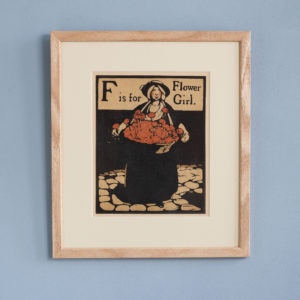
An Alphabet by William Nicholson, F is for Flower Girl,
£400 eachAn Alphabet by William Nicholson, F is for Flower Girl,
Nicholson was recommended by his friend, James McNeil Whistler to the publishers Heinemann as an original and expert wood-cut artist. The relationship with the publisher was highly successful, establishing Nicholson’s reputation as an illustrator. Between 1897 and 1900 he illustrated five works: An Alphabet, An Almanac of Twelve Sports, Twelve Portraits, London Types, and The Square Book of Animals.£400 each -
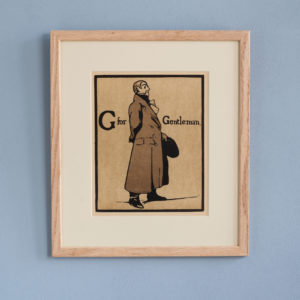
An Alphabet by William Nicholson, G for Gentleman,
£400 eachAn Alphabet by William Nicholson, G for Gentleman,
Nicholson was recommended by his friend, James McNeil Whistler to the publishers Heinemann as an original and expert wood-cut artist. The relationship with the publisher was highly successful, establishing Nicholson’s reputation as an illustrator. Between 1897 and 1900 he illustrated five works: An Alphabet, An Almanac of Twelve Sports, Twelve Portraits, London Types, and The Square Book of Animals.£400 each -
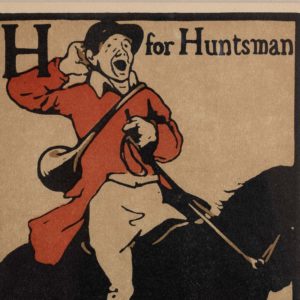
An Alphabet by William Nicholson, H for Huntsman,
£400 eachAn Alphabet by William Nicholson, H for Huntsman,
Nicholson was recommended by his friend, James McNeil Whistler to the publishers Heinemann as an original and expert wood-cut artist. The relationship with the publisher was highly successful, establishing Nicholson’s reputation as an illustrator. Between 1897 and 1900 he illustrated five works: An Alphabet, An Almanac of Twelve Sports, Twelve Portraits, London Types, and The Square Book of Animals.£400 each -
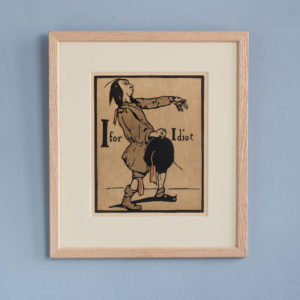
An Alphabet by William Nicholson, I for Idiot,
£400 eachAn Alphabet by William Nicholson, I for Idiot,
Nicholson was recommended by his friend, James McNeil Whistler to the publishers Heinemann as an original and expert wood-cut artist. The relationship with the publisher was highly successful, establishing Nicholson’s reputation as an illustrator. Between 1897 and 1900 he illustrated five works: An Alphabet, An Almanac of Twelve Sports, Twelve Portraits, London Types, and The Square Book of Animals.£400 each -
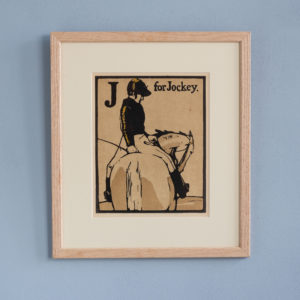
An Alphabet by William Nicholson, J for Jockey,
£400 eachAn Alphabet by William Nicholson, J for Jockey,
Nicholson was recommended by his friend, James McNeil Whistler to the publishers Heinemann as an original and expert wood-cut artist. The relationship with the publisher was highly successful, establishing Nicholson’s reputation as an illustrator. Between 1897 and 1900 he illustrated five works: An Alphabet, An Almanac of Twelve Sports, Twelve Portraits, London Types, and The Square Book of Animals.£400 each -
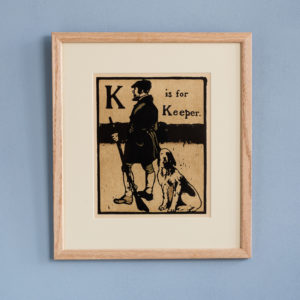
An Alphabet by William Nicholson, K is for Keeper,
£400 eachAn Alphabet by William Nicholson, K is for Keeper,
Nicholson was recommended by his friend, James McNeil Whistler to the publishers Heinemann as an original and expert wood-cut artist. The relationship with the publisher was highly successful, establishing Nicholson’s reputation as an illustrator. Between 1897 and 1900 he illustrated five works: An Alphabet, An Almanac of Twelve Sports, Twelve Portraits, London Types, and The Square Book of Animals.£400 each -
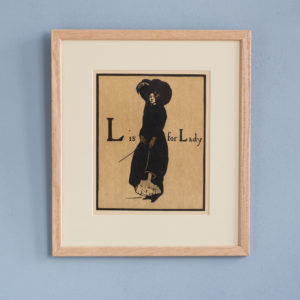
An Alphabet by William Nicholson, L is for Lady,
£400 eachAn Alphabet by William Nicholson, L is for Lady,
Nicholson was recommended by his friend, James McNeil Whistler to the publishers Heinemann as an original and expert wood-cut artist. The relationship with the publisher was highly successful, establishing Nicholson’s reputation as an illustrator. Between 1897 and 1900 he illustrated five works: An Alphabet, An Almanac of Twelve Sports, Twelve Portraits, London Types, and The Square Book of Animals.£400 each -
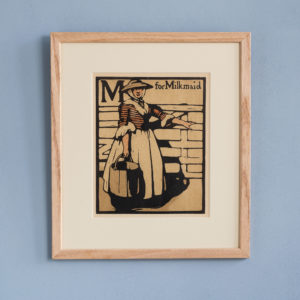
An Alphabet by William Nicholson, M for Milkmaid,
£400 eachAn Alphabet by William Nicholson, M for Milkmaid,
Nicholson was recommended by his friend, James McNeil Whistler to the publishers Heinemann as an original and expert wood-cut artist. The relationship with the publisher was highly successful, establishing Nicholson’s reputation as an illustrator. Between 1897 and 1900 he illustrated five works: An Alphabet, An Almanac of Twelve Sports, Twelve Portraits, London Types, and The Square Book of Animals.£400 each -
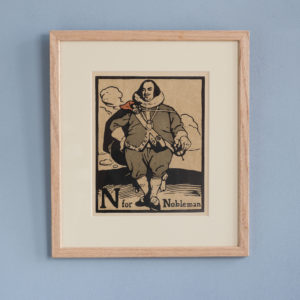
An Alphabet by William Nicholson, N for Nobleman,
£400 eachAn Alphabet by William Nicholson, N for Nobleman,
Nicholson was recommended by his friend, James McNeil Whistler to the publishers Heinemann as an original and expert wood-cut artist. The relationship with the publisher was highly successful, establishing Nicholson’s reputation as an illustrator. Between 1897 and 1900 he illustrated five works: An Alphabet, An Almanac of Twelve Sports, Twelve Portraits, London Types, and The Square Book of Animals.£400 each -
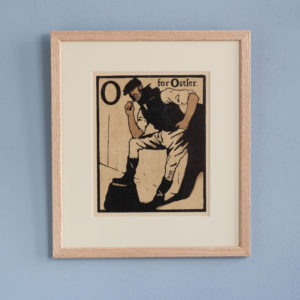
An Alphabet by William Nicholson, O for Ostler,
£400 eachAn Alphabet by William Nicholson, O for Ostler,
Nicholson was recommended by his friend, James McNeil Whistler to the publishers Heinemann as an original and expert wood-cut artist. The relationship with the publisher was highly successful, establishing Nicholson’s reputation as an illustrator. Between 1897 and 1900 he illustrated five works: An Alphabet, An Almanac of Twelve Sports, Twelve Portraits, London Types, and The Square Book of Animals.£400 each -
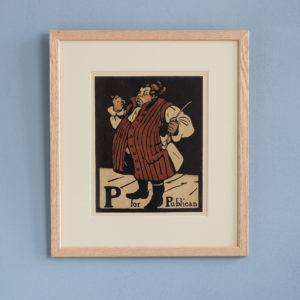
An Alphabet by William Nicholson, P for Publican,
£400 eachAn Alphabet by William Nicholson, P for Publican,
Nicholson was recommended by his friend, James McNeil Whistler to the publishers Heinemann as an original and expert wood-cut artist. The relationship with the publisher was highly successful, establishing Nicholson’s reputation as an illustrator. Between 1897 and 1900 he illustrated five works: An Alphabet, An Almanac of Twelve Sports, Twelve Portraits, London Types, and The Square Book of Animals.£400 each -
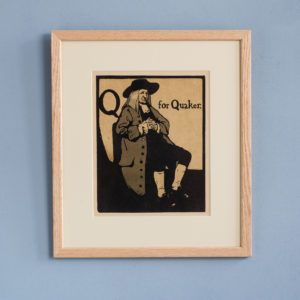
An Alphabet by William Nicholson, Q for Quaker,
£400 eachAn Alphabet by William Nicholson, Q for Quaker,
Nicholson was recommended by his friend, James McNeil Whistler to the publishers Heinemann as an original and expert wood-cut artist. The relationship with the publisher was highly successful, establishing Nicholson’s reputation as an illustrator. Between 1897 and 1900 he illustrated five works: An Alphabet, An Almanac of Twelve Sports, Twelve Portraits, London Types, and The Square Book of Animals.£400 each -
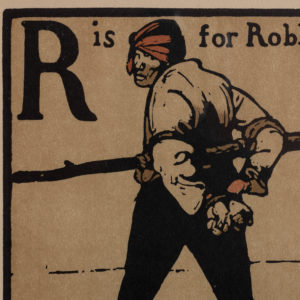
An Alphabet by William Nicholson, R is for Robber,
£400 eachAn Alphabet by William Nicholson, R is for Robber,
Nicholson was recommended by his friend, James McNeil Whistler to the publishers Heinemann as an original and expert wood-cut artist. The relationship with the publisher was highly successful, establishing Nicholson’s reputation as an illustrator. Between 1897 and 1900 he illustrated five works: An Alphabet, An Almanac of Twelve Sports, Twelve Portraits, London Types, and The Square Book of Animals.£400 each -

An Alphabet by William Nicholson, S for Sportsman,
£400 eachAn Alphabet by William Nicholson, S for Sportsman,
Nicholson was recommended by his friend, James McNeil Whistler to the publishers Heinemann as an original and expert wood-cut artist. The relationship with the publisher was highly successful, establishing Nicholson’s reputation as an illustrator. Between 1897 and 1900 he illustrated five works: An Alphabet, An Almanac of Twelve Sports, Twelve Portraits, London Types, and The Square Book of Animals.£400 each -
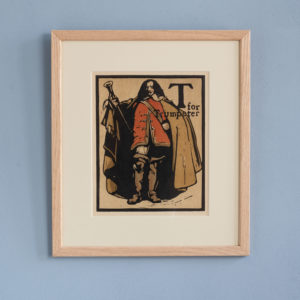
An Alphabet by William Nicholson, T for Trumpeter,
£400 eachAn Alphabet by William Nicholson, T for Trumpeter,
Nicholson was recommended by his friend, James McNeil Whistler to the publishers Heinemann as an original and expert wood-cut artist. The relationship with the publisher was highly successful, establishing Nicholson’s reputation as an illustrator. Between 1897 and 1900 he illustrated five works: An Alphabet, An Almanac of Twelve Sports, Twelve Portraits, London Types, and The Square Book of Animals.£400 each -
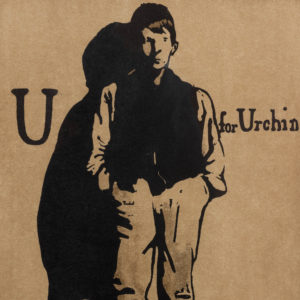
An Alphabet by William Nicholson, U for Urchin,
£400 eachAn Alphabet by William Nicholson, U for Urchin,
Nicholson was recommended by his friend, James McNeil Whistler to the publishers Heinemann as an original and expert wood-cut artist. The relationship with the publisher was highly successful, establishing Nicholson’s reputation as an illustrator. Between 1897 and 1900 he illustrated five works: An Alphabet, An Almanac of Twelve Sports, Twelve Portraits, London Types, and The Square Book of Animals.£400 each -
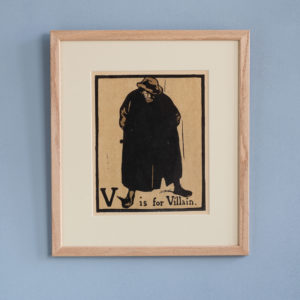
An Alphabet by William Nicholson, V is for Villain,
£400 eachAn Alphabet by William Nicholson, V is for Villain,
Nicholson was recommended by his friend, James McNeil Whistler to the publishers Heinemann as an original and expert wood-cut artist. The relationship with the publisher was highly successful, establishing Nicholson’s reputation as an illustrator. Between 1897 and 1900 he illustrated five works: An Alphabet, An Almanac of Twelve Sports, Twelve Portraits, London Types, and The Square Book of Animals.£400 each -
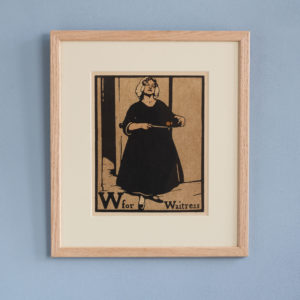
An Alphabet by William Nicholson, W for Waitress,
£400 eachAn Alphabet by William Nicholson, W for Waitress,
Nicholson was recommended by his friend, James McNeil Whistler to the publishers Heinemann as an original and expert wood-cut artist. The relationship with the publisher was highly successful, establishing Nicholson’s reputation as an illustrator. Between 1897 and 1900 he illustrated five works: An Alphabet, An Almanac of Twelve Sports, Twelve Portraits, London Types, and The Square Book of Animals.£400 each -
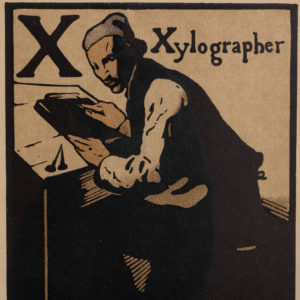
An Alphabet by William Nicholson, X Xylographer,
£400 eachAn Alphabet by William Nicholson, X Xylographer,
Nicholson was recommended by his friend, James McNeil Whistler to the publishers Heinemann as an original and expert wood-cut artist. The relationship with the publisher was highly successful, establishing Nicholson’s reputation as an illustrator. Between 1897 and 1900 he illustrated five works: An Alphabet, An Almanac of Twelve Sports, Twelve Portraits, London Types, and The Square Book of Animals.£400 each -
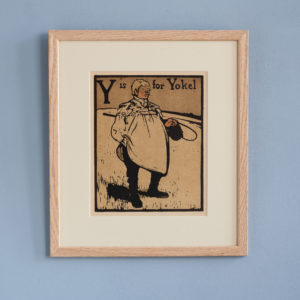
An Alphabet by William Nicholson, Y is for Yokel,
£400 eachAn Alphabet by William Nicholson, Y is for Yokel,
Nicholson was recommended by his friend, James McNeil Whistler to the publishers Heinemann as an original and expert wood-cut artist. The relationship with the publisher was highly successful, establishing Nicholson’s reputation as an illustrator. Between 1897 and 1900 he illustrated five works: An Alphabet, An Almanac of Twelve Sports, Twelve Portraits, London Types, and The Square Book of Animals.£400 each -
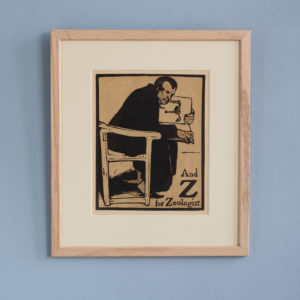
An Alphabet by William Nicholson, And Z for Zoologist,
£400 eachAn Alphabet by William Nicholson, And Z for Zoologist,
Nicholson was recommended by his friend, James McNeil Whistler to the publishers Heinemann as an original and expert wood-cut artist. The relationship with the publisher was highly successful, establishing Nicholson’s reputation as an illustrator. Between 1897 and 1900 he illustrated five works: An Alphabet, An Almanac of Twelve Sports, Twelve Portraits, London Types, and The Square Book of Animals.£400 each -
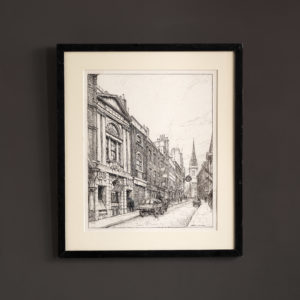
Porters Hall, by Hubert John Williams.
£395Porters Hall, by Hubert John Williams.
Hubert John Williams (1905-1989). Portrait, landscape and architectural painter, etcher and illustrator. Williams was born in Beckenham, Kent in 1905 and later studied at the Royal Academy Schools where he was awarded the Landseer Scholarship for 1928. He also attended the St Martins School of Art and the L.C.C. Schools. Between 1926 and 1939 he exhibited at the Royal Academy, Royal Scottish Academy, Royal Institute of Painters in Oil, and the New English Art Club amongst others. During WWII he worked as a cartographer in the War Office, then as commercial illustrator from 1946 specialising in children's education. His work can be found in many public collections including The Imperial War Museum and Museum of London.£395 -
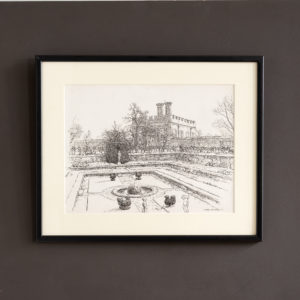
The Pond Garden, Hampton Court, by Hubert John Williams.
£395The Pond Garden, Hampton Court, by Hubert John Williams.
Hubert John Williams (1905-1989). Portrait, landscape and architectural painter, etcher and illustrator. Williams was born in Beckenham, Kent in 1905 and later studied at the Royal Academy Schools where he was awarded the Landseer Scholarship for 1928. He also attended the St Martins School of Art and the L.C.C. Schools. Between 1926 and 1939 he exhibited at the Royal Academy, Royal Scottish Academy, Royal Institute of Painters in Oil, and the New English Art Club amongst others. During WWII he worked as a cartographer in the War Office, then as commercial illustrator from 1946 specialising in children's education. His work can be found in many public collections including The Imperial War Museum and Museum of London.£395 -
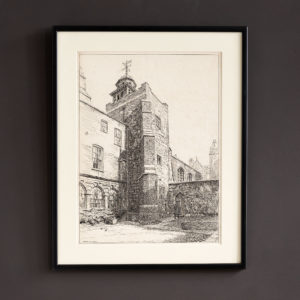
The Charterhouse, by Hubert John Williams.
£395The Charterhouse, by Hubert John Williams.
Hubert John Williams (1905-1989). Portrait, landscape and architectural painter, etcher and illustrator. Williams was born in Beckenham, Kent in 1905 and later studied at the Royal Academy Schools where he was awarded the Landseer Scholarship for 1928. He also attended the St Martins School of Art and the L.C.C. Schools. Between 1926 and 1939 he exhibited at the Royal Academy, Royal Scottish Academy, Royal Institute of Painters in Oil, and the New English Art Club amongst others. During WWII he worked as a cartographer in the War Office, then as commercial illustrator from 1946 specialising in children's education. His work can be found in many public collections including The Imperial War Museum and Museum of London.£395 -
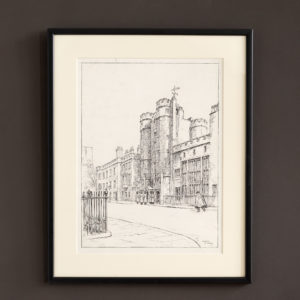
St. James Palace, by Hubert John Williams.
£395St. James Palace, by Hubert John Williams.
Hubert John Williams (1905-1989). Portrait, landscape and architectural painter, etcher and illustrator. Williams was born in Beckenham, Kent in 1905 and later studied at the Royal Academy Schools where he was awarded the Landseer Scholarship for 1928. He also attended the St Martins School of Art and the L.C.C. Schools. Between 1926 and 1939 he exhibited at the Royal Academy, Royal Scottish Academy, Royal Institute of Painters in Oil, and the New English Art Club amongst others. During WWII he worked as a cartographer in the War Office, then as commercial illustrator from 1946 specialising in children's education. His work can be found in many public collections including The Imperial War Museum and Museum of London.£395 -
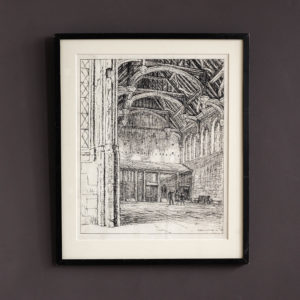
Eltham Palace, by Hubert John Williams.
£395Eltham Palace, by Hubert John Williams.
Hubert John Williams (1905-1989). Portrait, landscape and architectural painter, etcher and illustrator. Williams was born in Beckenham, Kent in 1905 and later studied at the Royal Academy Schools where he was awarded the Landseer Scholarship for 1928. He also attended the St Martins School of Art and the L.C.C. Schools. Between 1926 and 1939 he exhibited at the Royal Academy, Royal Scottish Academy, Royal Institute of Painters in Oil, and the New English Art Club amongst others. During WWII he worked as a cartographer in the War Office, then as commercial illustrator from 1946 specialising in children's education. His work can be found in many public collections including The Imperial War Museum and Museum of London.£395 -
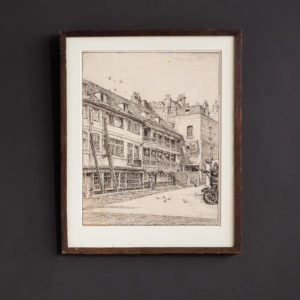
The George Inn, Borough High Street, by Hubert John Williams.
£395The George Inn, Borough High Street, by Hubert John Williams.
Hubert John Williams (1905-1989). Portrait, landscape and architectural painter, etcher and illustrator. Williams was born in Beckenham, Kent in 1905 and later studied at the Royal Academy Schools where he was awarded the Landseer Scholarship for 1928. He also attended the St Martins School of Art and the L.C.C. Schools. Between 1926 and 1939 he exhibited at the Royal Academy, Royal Scottish Academy, Royal Institute of Painters in Oil, and the New English Art Club amongst others. During WWII he worked as a cartographer in the War Office, then as commercial illustrator from 1946 specialising in children's education. His work can be found in many public collections including The Imperial War Museum and Museum of London.£395 -
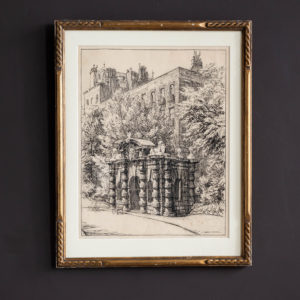
The York Watergate by Hubert John Williams.
£395The York Watergate by Hubert John Williams.
Hubert John Williams (1905-1989). Portrait, landscape and architectural painter, etcher and illustrator. Williams was born in Beckenham, Kent in 1905 and later studied at the Royal Academy Schools where he was awarded the Landseer Scholarship for 1928. He also attended the St Martins School of Art and the L.C.C. Schools. Between 1926 and 1939 he exhibited at the Royal Academy, Royal Scottish Academy, Royal Institute of Painters in Oil, and the New English Art Club amongst others. During WWII he worked as a cartographer in the War Office, then as commercial illustrator from 1946 specialising in children's education. His work can be found in many public collections including The Imperial War Museum and Museum of London.£395 -

The Blackheath Golfer
£395The Blackheath Golfer
A framed colour mezzotint on wove paper by Valentine Green after a painting by Lemuel Abbott showing William Innes (1760-1803) captain of the Society of Golfers at Blackheath, now known as Royal Blackheath Golf Club.£395 -
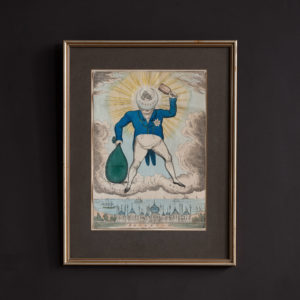
A total Eclipse, or The Moon passing the Sun’s disc
£380A total Eclipse, or The Moon passing the Sun’s disc
Hand coloured line engraving by John Fairburn. King George IV's star is eclipsed by the crecent moon of Catherine of Brunswick while suspended in the sky over the Brighton Pavillion. In his right hand he holds a sack full of slanders. A commentary on the acrimonious public divorce of the King and the Queen Consort in the 1820s;£380 -
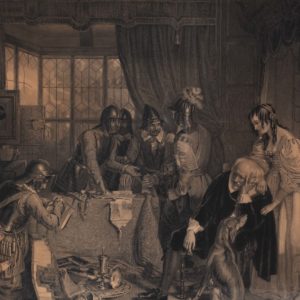
Pillage and Destruction of Basing House, Hants,
£350Pillage and Destruction of Basing House, Hants,
A Mid Victorian engraving by the London artist and printmaker John George Murray after an original oil painting by Charles Landseer showing the plundering of Basing House during the English Civil Wars. Mounted and framed in a walnut ogee profile with foliated gilt slip.£350 -
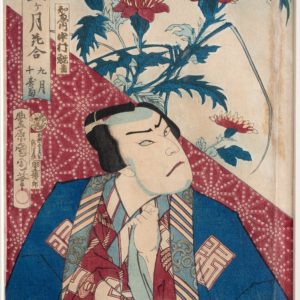
“Twelve Months of Flowers September Senju Chrysanthemum “Chienai Nakamura Suzaku”by Toyohara Kunichika
£350 -
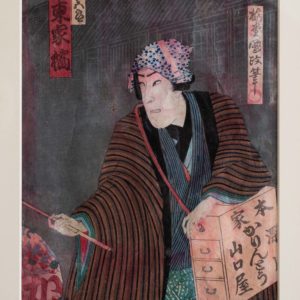
Bandō Kakitsu I, an actor by Baido Kunimasa
£350Bandō Kakitsu I, an actor by Baido Kunimasa
R/H section of a triptych depicting the actor Bandō Kakitsu I playing a karinto merchant in the play Chitose-za shin kyogen Tsuki shiraha bonji horimono.£350 -
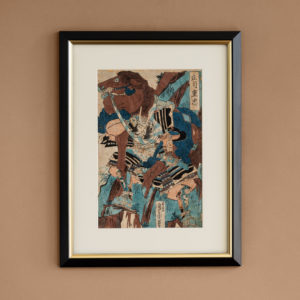
Samurai Warlord, Hatakeyama Shigetada by Utagawa Kunimune
£350Samurai Warlord, Hatakeyama Shigetada by Utagawa Kunimune
Hatakeyama Shigetada, was a warrior of the early Kamakura Period (1185-1333) famed for his virtue and bravery.£350 -
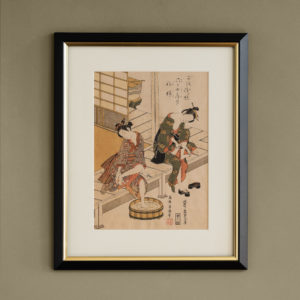
Pedicure by Torii Kiyohiro
£350Pedicure by Torii Kiyohiro
Produced by of the leading artists of the era of two-colour 'benizurie' prints, where the works are printed in pink (beni) and green, a style that peaked in the early 1740s.£350 -
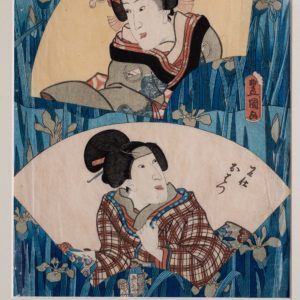
Yaoya oshichi meshitsukai o Hatsu by Utagawa Kunisada
£350Yaoya oshichi meshitsukai o Hatsu by Utagawa Kunisada
Yaoya Oshichi was a daughter of the greengrocer Tarobei, who lived in the Hongō neighborhood of Edo at the beginning of the Edo period. She was burned at the stake for attempting to commit arson. The story became the subject of joruri puppet plays.£350 -
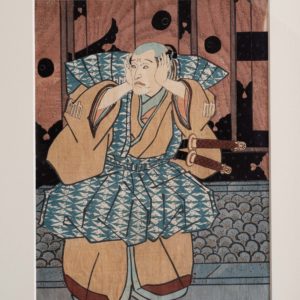
An actor from Chushingura by Utagawa Kunisada
£350An actor from Chushingura by Utagawa Kunisada
Chushingura, was Japan’s most popular kabuki play, with its origins in an event of organized mob violence in 1702, its a complex story of unquestioning loyalty, revenge, conflict, love, and punishment.£350 -
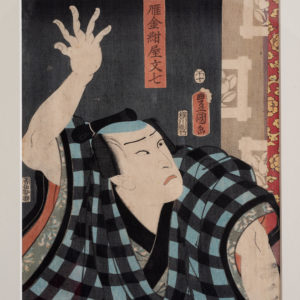
Kataoka Nizaemon VIII as Karigane Kon’ya Bunshichi by Utagawa Kunisada I (Toyokuni III)
£350Kataoka Nizaemon VIII as Karigane Kon’ya Bunshichi by Utagawa Kunisada I (Toyokuni III)
This print originally formed the R/H side from a triptych of the play, Eiyû Koko ni Yorimasa£350 -
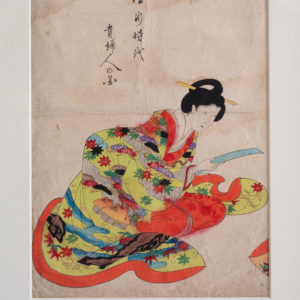
A girl reading poetry by Toyohara Chikanobu
£350A girl reading poetry by Toyohara Chikanobu
This print originally formed the R/H side of a triptych.£350 -
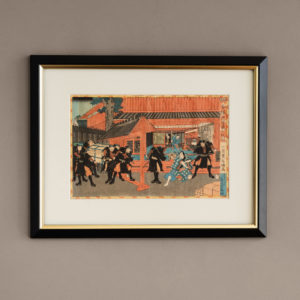
A scene from ’47 Ronin’ a Japanese Samurai Tale, 1852, after Utagawa Fusatane (active 1854-1889)
£350A scene from ’47 Ronin’ a Japanese Samurai Tale, 1852, after Utagawa Fusatane (active 1854-1889)
This print vividly depicts the famous night attack of 47 ronin, or masterless samurai, on the house of Moronao.£350 -
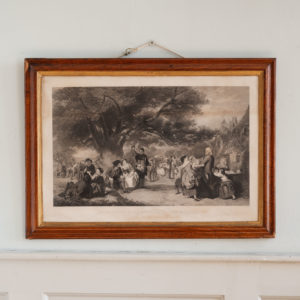
An English Merry-Making in the Olden Time – William Powell Frith
£350An English Merry-Making in the Olden Time – William Powell Frith
An large oak and gilt framed engraving by William Powell Frith showing a village celebration of the mid 17th Century taking place in the shade of a large oak tree.£350 -
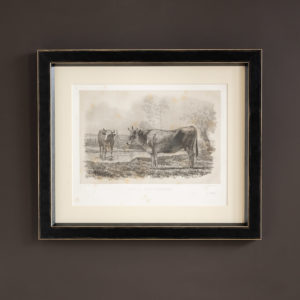
Original lithographs of Cattle Breeds published 1862, ‘Vache Parthenaise’,
£300 eachOriginal lithographs of Cattle Breeds published 1862, ‘Vache Parthenaise’,
Printed by Lemercier of Paris.£300 each -
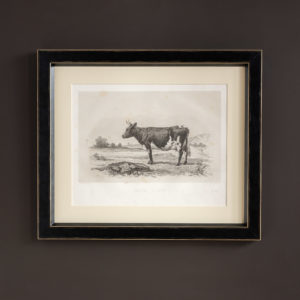
Original lithographs of Cattle Breeds published 1862, ‘Vache D’Ayr’,
£300 eachOriginal lithographs of Cattle Breeds published 1862, ‘Vache D’Ayr’,
Printed by Lemercier of Paris.£300 each -
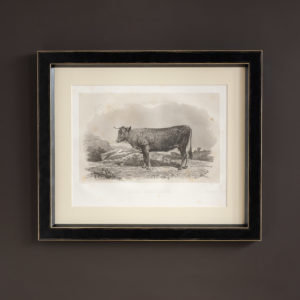
Original lithographs of Cattle Breeds published 1862, ‘Vache Garonnaise’,
£300 eachOriginal lithographs of Cattle Breeds published 1862, ‘Vache Garonnaise’,
Printed by Lemercier of Paris.£300 each -
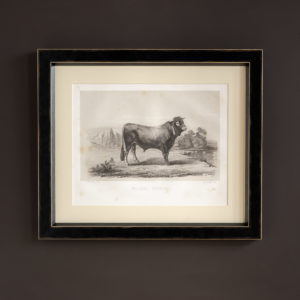
Original lithographs of Cattle Breeds published 1862, ‘Taureau Bazadais’,
£300 eachOriginal lithographs of Cattle Breeds published 1862, ‘Taureau Bazadais’,
Printed by Lemercier of Paris.£300 each -
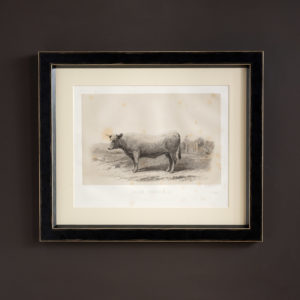
Original lithographs of Cattle Breeds published 1862, ‘Vache Charolaise’,
£300 eachOriginal lithographs of Cattle Breeds published 1862, ‘Vache Charolaise’,
Printed by Lemercier of Paris.£300 each -
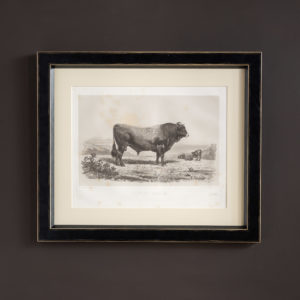
Original lithographs of Cattle Breeds published 1862, ‘Taureau Gascon’,
£300 eachOriginal lithographs of Cattle Breeds published 1862, ‘Taureau Gascon’,
Printed by Lemercier of Paris.£300 each -
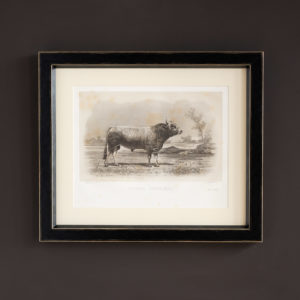
Original lithographs of Cattle Breeds published 1862, ‘Taureau Parthenais’,
£300 eachOriginal lithographs of Cattle Breeds published 1862, ‘Taureau Parthenais’,
Printed by Lemercier of Paris.£300 each -
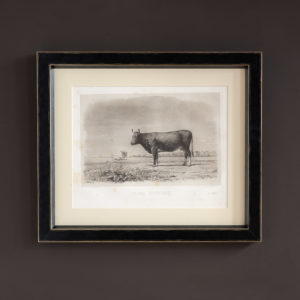
Original lithographs of Cattle Breeds published 1862, ‘Vache Bretonne’,
£300 eachOriginal lithographs of Cattle Breeds published 1862, ‘Vache Bretonne’,
Printed by Lemercier of Paris.£300 each -
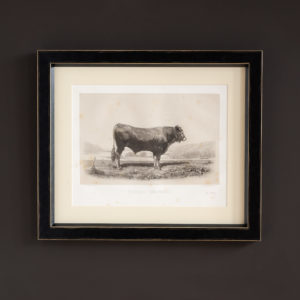
Original lithographs of Cattle Breeds published 1862, ‘Taureau Garonnais’,
£300 eachOriginal lithographs of Cattle Breeds published 1862, ‘Taureau Garonnais’,
Printed by Lemercier of Paris.£300 each -
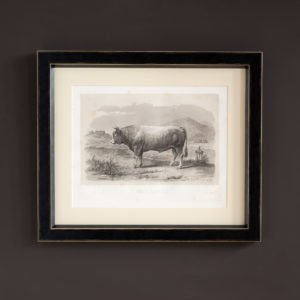
Original lithographs of Cattle Breeds published 1862, ‘Taureau Limousin’,
£300 eachOriginal lithographs of Cattle Breeds published 1862, ‘Taureau Limousin’,
Printed by Lemercier of Paris.£300 each -
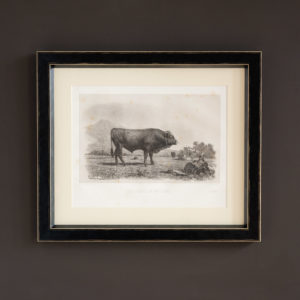
Original lithographs of Cattle Breeds published 1862, ‘Taureau D’Aubrac’,
£300 eachOriginal lithographs of Cattle Breeds published 1862, ‘Taureau D’Aubrac’,
Printed by Lemercier of Paris.£300 each -
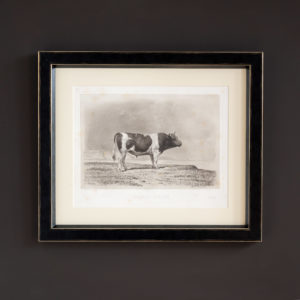
Original lithographs of Cattle Breeds published 1862, ‘Taureau Breton’,
£300 eachOriginal lithographs of Cattle Breeds published 1862, ‘Taureau Breton’,
Printed by Lemercier of Paris.£300 each -
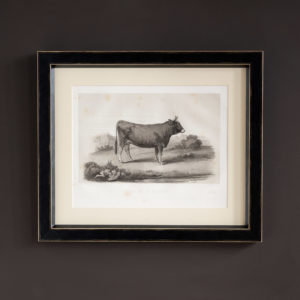
Original lithographs of Cattle Breeds published 1862, ‘Vache D’Aubrac’,
£300 eachOriginal lithographs of Cattle Breeds published 1862, ‘Vache D’Aubrac’,
Printed by Lemercier of Paris.£300 each -
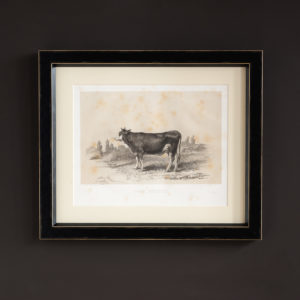
Original lithographs of Cattle Breeds published 1862, ‘Vache Mancelle’,
£300 eachOriginal lithographs of Cattle Breeds published 1862, ‘Vache Mancelle’,
Printed by Lemercier of Paris.£300 each -
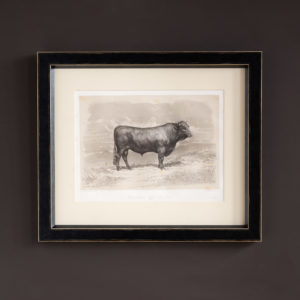
Original lithographs of Cattle Breeds published 1862, ‘Taureau de Salers’,
£300 eachOriginal lithographs of Cattle Breeds published 1862, ‘Taureau de Salers’,
Printed by Lemercier of Paris.£300 each -
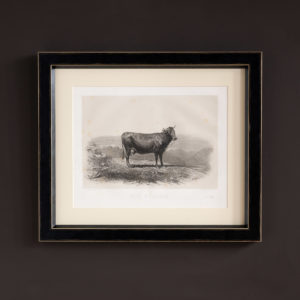
Original lithographs of Cattle Breeds published 1862, ‘Vache D’Oberhasli’,
£300 eachOriginal lithographs of Cattle Breeds published 1862, ‘Vache D’Oberhasli’,
Printed by Lemercier of Paris.£300 each -
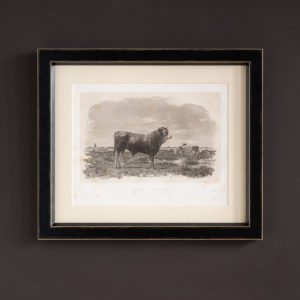
Original lithographs of Cattle Breeds published 1862, ‘Taureau Landais’,
£300 eachOriginal lithographs of Cattle Breeds published 1862, ‘Taureau Landais’,
Printed by Lemercier of Paris.£300 each -
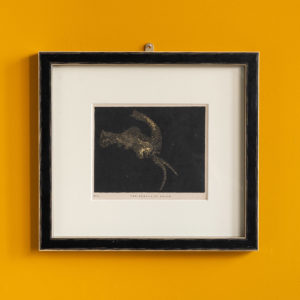
“The Beauty of the Heavens: A Pictorial Display of The Astronomical Phenomena of The Universe” by Charles Blunt, ‘The Nebula of Orion’,
£295 each“The Beauty of the Heavens: A Pictorial Display of The Astronomical Phenomena of The Universe” by Charles Blunt, ‘The Nebula of Orion’,
In the mid-19th century, Home Education had become very popular for the masses and lecturer, Charles Blunt seeing a gap in the market came up with these illustrations. Blunt who specialised in astronomy and natural philosophy, saw the need for a series of ‘accurate yet popular’ plates illustrating the known Universe. These hand-finished aquatints prints were based on Blunt’s own drawings, depicting celestial and astrological subjects.£295 each -
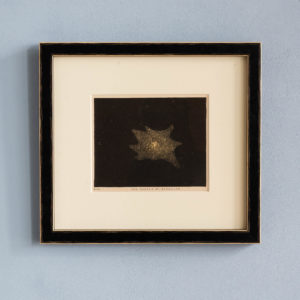
“The Beauty of the Heavens: A Pictorial Display of The Astronomical Phenomena of The Universe” by Charles Blunt, ‘The Nebula of Hercules’,
£295 each“The Beauty of the Heavens: A Pictorial Display of The Astronomical Phenomena of The Universe” by Charles Blunt, ‘The Nebula of Hercules’,
In the mid-19th century, Home Education had become very popular for the masses and lecturer, Charles Blunt seeing a gap in the market came up with these illustrations. Blunt who specialised in astronomy and natural philosophy, saw the need for a series of ‘accurate yet popular’ plates illustrating the known Universe. These hand-finished aquatints prints were based on Blunt’s own drawings, depicting celestial and astrological subjects.£295 each -
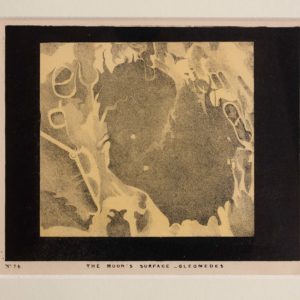
“The Beauty of the Heavens: A Pictorial Display of The Astronomical Phenomena of The Universe” by Charles Blunt, ‘The Moon’s Surface – Cleomedes’,
£295 each“The Beauty of the Heavens: A Pictorial Display of The Astronomical Phenomena of The Universe” by Charles Blunt, ‘The Moon’s Surface – Cleomedes’,
In the mid-19th century, Home Education had become very popular for the masses and lecturer, Charles Blunt seeing a gap in the market came up with these illustrations. Blunt who specialised in astronomy and natural philosophy, saw the need for a series of ‘accurate yet popular’ plates illustrating the known Universe. These hand-finished aquatints prints were based on Blunt’s own drawings, depicting celestial and astrological subjects.£295 each -
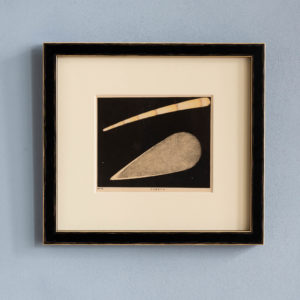
“The Beauty of the Heavens: A Pictorial Display of The Astronomical Phenomena of The Universe” by Charles Blunt, ‘Comets’,
£295 each“The Beauty of the Heavens: A Pictorial Display of The Astronomical Phenomena of The Universe” by Charles Blunt, ‘Comets’,
In the mid-19th century, Home Education had become very popular for the masses and lecturer, Charles Blunt seeing a gap in the market came up with these illustrations. Blunt who specialised in astronomy and natural philosophy, saw the need for a series of ‘accurate yet popular’ plates illustrating the known Universe. These hand-finished aquatints prints were based on Blunt’s own drawings, depicting celestial and astrological subjects.£295 each -
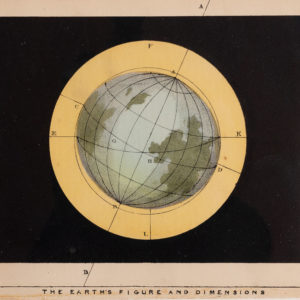
“The Beauty of the Heavens: A Pictorial Display of The Astronomical Phenomena of The Universe” by Charles Blunt, ‘The Earth’s Figure and Dimensions’,
£295 each“The Beauty of the Heavens: A Pictorial Display of The Astronomical Phenomena of The Universe” by Charles Blunt, ‘The Earth’s Figure and Dimensions’,
In the mid-19th century, Home Education had become very popular for the masses and lecturer, Charles Blunt seeing a gap in the market came up with these illustrations. Blunt who specialised in astronomy and natural philosophy, saw the need for a series of ‘accurate yet popular’ plates illustrating the known Universe. These hand-finished aquatints prints were based on Blunt’s own drawings, depicting celestial and astrological subjects.£295 each -
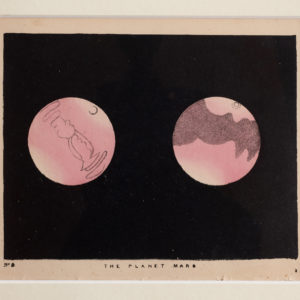
“The Beauty of the Heavens: A Pictorial Display of The Astronomical Phenomena of The Universe” by Charles Blunt, ‘The Planet Mars’,
£295 each“The Beauty of the Heavens: A Pictorial Display of The Astronomical Phenomena of The Universe” by Charles Blunt, ‘The Planet Mars’,
In the mid-19th century, Home Education had become very popular for the masses and lecturer, Charles Blunt seeing a gap in the market came up with these illustrations. Blunt who specialised in astronomy and natural philosophy, saw the need for a series of ‘accurate yet popular’ plates illustrating the known Universe. These hand-finished aquatints prints were based on Blunt’s own drawings, depicting celestial and astrological subjects.£295 each -
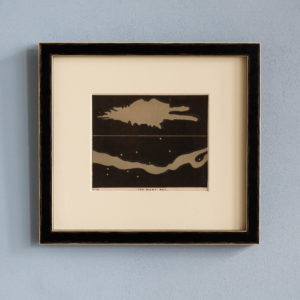
“The Beauty of the Heavens: A Pictorial Display of The Astronomical Phenomena of The Universe” by Charles Blunt, ‘The Milky Way’,
£295 each“The Beauty of the Heavens: A Pictorial Display of The Astronomical Phenomena of The Universe” by Charles Blunt, ‘The Milky Way’,
In the mid-19th century, Home Education had become very popular for the masses and lecturer, Charles Blunt seeing a gap in the market came up with these illustrations. Blunt who specialised in astronomy and natural philosophy, saw the need for a series of ‘accurate yet popular’ plates illustrating the known Universe. These hand-finished aquatints prints were based on Blunt’s own drawings, depicting celestial and astrological subjects.£295 each -
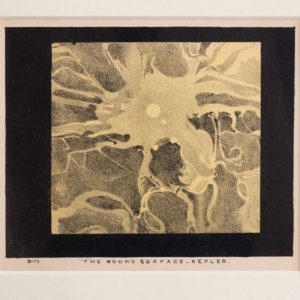
“The Beauty of the Heavens: A Pictorial Display of The Astronomical Phenomena of The Universe” by Charles Blunt, ‘The Moon’s Surface – Kepler’,
£295 each“The Beauty of the Heavens: A Pictorial Display of The Astronomical Phenomena of The Universe” by Charles Blunt, ‘The Moon’s Surface – Kepler’,
In the mid-19th century, Home Education had become very popular for the masses and lecturer, Charles Blunt seeing a gap in the market came up with these illustrations. Blunt who specialised in astronomy and natural philosophy, saw the need for a series of ‘accurate yet popular’ plates illustrating the known Universe. These hand-finished aquatints prints were based on Blunt’s own drawings, depicting celestial and astrological subjects.£295 each -
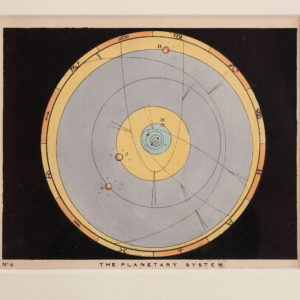
“The Beauty of the Heavens: A Pictorial Display of The Astronomical Phenomena of The Universe” by Charles Blunt, ‘The Planetary System’,
£295 each“The Beauty of the Heavens: A Pictorial Display of The Astronomical Phenomena of The Universe” by Charles Blunt, ‘The Planetary System’,
In the mid-19th century, Home Education had become very popular for the masses and lecturer, Charles Blunt seeing a gap in the market came up with these illustrations. Blunt who specialised in astronomy and natural philosophy, saw the need for a series of ‘accurate yet popular’ plates illustrating the known Universe. These hand-finished aquatints prints were based on Blunt’s own drawings, depicting celestial and astrological subjects.£295 each -
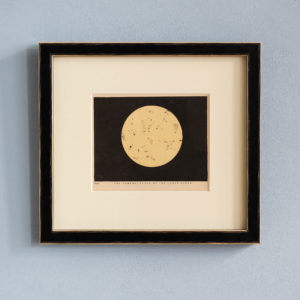
“The Beauty of the Heavens: A Pictorial Display of The Astronomical Phenomena of The Universe” by Charles Blunt, ‘The Nomenclature of the Lunar Spots’,
£295 each“The Beauty of the Heavens: A Pictorial Display of The Astronomical Phenomena of The Universe” by Charles Blunt, ‘The Nomenclature of the Lunar Spots’,
In the mid-19th century, Home Education had become very popular for the masses and lecturer, Charles Blunt seeing a gap in the market came up with these illustrations. Blunt who specialised in astronomy and natural philosophy, saw the need for a series of ‘accurate yet popular’ plates illustrating the known Universe. These hand-finished aquatints prints were based on Blunt’s own drawings, depicting celestial and astrological subjects.£295 each -
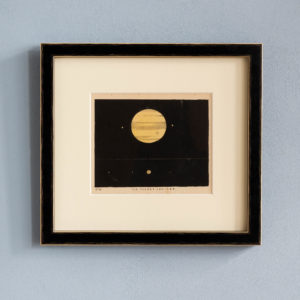
“The Beauty of the Heavens: A Pictorial Display of The Astronomical Phenomena of The Universe” by Charles Blunt, ‘The Planet Jupiter’,
£295 each“The Beauty of the Heavens: A Pictorial Display of The Astronomical Phenomena of The Universe” by Charles Blunt, ‘The Planet Jupiter’,
In the mid-19th century, Home Education had become very popular for the masses and lecturer, Charles Blunt seeing a gap in the market came up with these illustrations. Blunt who specialised in astronomy and natural philosophy, saw the need for a series of ‘accurate yet popular’ plates illustrating the known Universe. These hand-finished aquatints prints were based on Blunt’s own drawings, depicting celestial and astrological subjects.£295 each
Featured Items
-

Portraits Part II by Constantin Guys, Verve Vol 2 / No. 5-6.
£500Portraits Part II by Constantin Guys, Verve Vol 2 / No. 5-6.
The Verve Review was a purposefully luxurious. It ran from 1937 to 1960, but with only 38 editions available, due to the high degree of design and editorial work dedicated to each issue. Each edition contained unique lithographic prints, commissioned by the editor, and each cover a double-page lithograph elaborated by one of the artists contained within. It was the brainchild of its editor Stratis Eleftheriades, a Greek National who moved to Paris in the early thirties to take part in the growing Modernist movement, writing under the name of Teriade.£500 -

Comets by Wassily Kandinsky, Verve Vol. 1 / No. 2.
£800Comets by Wassily Kandinsky, Verve Vol. 1 / No. 2.
The Verve Review was a purposefully luxurious. It ran from 1937 to 1960, but with only 38 editions available, due to the high degree of design and editorial work dedicated to each issue. Each edition contained unique lithographic prints, commissioned by the editor, and each cover a double-page lithograph elaborated by one of the artists contained within. It was the brainchild of its editor Stratis Eleftheriades, a Greek National who moved to Paris in the early thirties to take part in the growing Modernist movement, writing under the name of Teriade.£800 -

The Four Elements, Water by Fernand Leger, Verve Vol. 1 / No. 1.
£600The Four Elements, Water by Fernand Leger, Verve Vol. 1 / No. 1.
The Verve Review was a purposefully luxurious. It ran from 1937 to 1960, but with only 38 editions available, due to the high degree of design and editorial work dedicated to each issue. Each edition contained unique lithographic prints, commissioned by the editor, and each cover a double-page lithograph elaborated by one of the artists contained within. It was the brainchild of its editor Stratis Eleftheriades, a Greek National who moved to Paris in the early thirties to take part in the growing Modernist movement, writing under the name of Teriade.£600 -

The Four Elements, Earth by Francisco Bores, Verve Vol. 1 / No. 1.
£600The Four Elements, Earth by Francisco Bores, Verve Vol. 1 / No. 1.
The Verve Review was a purposefully luxurious. It ran from 1937 to 1960, but with only 38 editions available, due to the high degree of design and editorial work dedicated to each issue. Each edition contained unique lithographic prints, commissioned by the editor, and each cover a double-page lithograph elaborated by one of the artists contained within. It was the brainchild of its editor Stratis Eleftheriades, a Greek National who moved to Paris in the early thirties to take part in the growing Modernist movement, writing under the name of Teriade.£600

